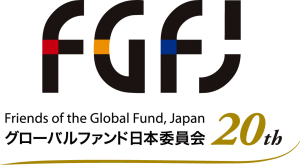“Ending AIDS by 2030: Science, Community, and Political Commitment”
Symposium with new Global Fund Executive Director Peter Sands
Read Full Report of the Symposium
In conjunction with the first official visit to Japan by Peter Sands, newly appointed executive director of the Global Fund to Fight AIDS, Tuberculosis and Malaria, a symposium will be held by Japan Center for International Exchange/Friends of the Global Fund, Japan (FGFJ) in cooperation with the International AIDS Society (IAS). We invite all those interested in the fight against HIV — researchers, clinicians, health care workers, civil society activists, private sector representatives, people living with or affected by HIV—to join us to review the state of the epidemic in Japan and globally from a scientific, policy, and human rights perspective. Mr. Sands will be joined by leading scientists, policymakers, and advocates to discuss what needs to be done, and by whom, to ensure that we do not miss the opportunity to end one of the greatest epidemics of modern times.
| Date | April 24, 2018 (Tuesday), 1:30–5:30pm (Followed by a reception) |
|---|---|
| Venue | Hinohara Hall, OMURA Susumu & Mieko Memorial, St. Luke’s Center for Clinical Academia. 3-6-2 Tsukiji, Chuo-ku, Tokyo [Map] |
| Co-organizers | International AIDS Society Japan Center for International Exchange (JCIE)/Friends of the Global Fund, Japan (FGFJ) |
| Support | The Global Fund to Fight AIDS, Tuberculosis and Malaria Japanese Society for AIDS Research St. Luke’s International University Graduate School of Public Health Japan AIDS Prevention Foundation |
| Language | English (Japanese simultaneous interpretation) |
| Capacity | 100 |
| Fee/Registration |
Free. Registration is requested and will be closed once capacity (100) is reached.
|
The end of AIDS is within reach – but only if we redouble our efforts
Last year, 20.9 million people infected with HIV received antiretroviral treatment. The rates of infection are declining in most parts of the world and the number of people dying of AIDS-related causes each year has decreased significantly. This is rightly celebrated as a major global health achievement.
However, it is sobering to realize that despite these successes, 1.8 million new HIV infections occurred in 2016 globally, pediatric HIV infection has not yet been eliminated, and HIV remains the second most common cause of death among youth worldwide.
In Japan, too, the fight has not yet been won. While Japan is not a country with a high burden of HIV infection and usually offers excellent treatment outcomes for HIV-infected people, the country has not yet reached global targets for diagnoses and linkage to treatment, despite its highly efficient healthcare system.
Medical progress alone cannot ensure effective control of the HIV epidemic. Political will to provide resources and implement pragmatic approaches based on human rights is required to ensure that new knowledge benefits those impacted by HIV.
PROGRAM
Welcome
- Owen Ryan, Executive Director, International AIDS Society (IAS)
Remarks
- Chieko Ikeda, Senior Assistant Minister for Global Health, Ministry of Health, Labour and Welfare, Japan
HIV and AIDS: Are We on Track towards Elimination?
- Adeeba Kamarulzaman, Dean, Faculty of Medicine, University of Malaya; Member, IAS Governing Council
- Aikichi Iwamoto, Managing Director, Department of Research Promotion, Japan Agency for Medical Research and Development; Emeritus Professor, University of Tokyo
A Conversation: Funding the Global HIV Response to Accelerate Progress towards the 2030 Target
- Peter Sands, Executive Director, the Global Fund to Fight AIDS, Tuberculosis and Malaria
- Tamaki Tsukada, Deputy Assistant Minister for International Cooperation and Global Issues, Ministry of Foreign Affairs of Japan
The Science of Treatment and Prevention: What Do We Know, What Are the Gaps?
[Panelists]
- Shuzo Matsushita, Professor, Center for AIDS Research, Kumamoto University and member of the IAS Governing Council
- Daisuke Mizushima, AIDS Clinical Center, National Center for Global Health and Medicine
[Moderators]
- Hiroyoshi Endo, Dean, St. Luke’s International University Graduate School of Public Health
- Shinichi Oka, Director, AIDS Clinical Center, National Center for Global Health and Medicine
Rights and Activism for Health for All
[Panelists]
- Ryuhei Kawada, Member, House of Councillors, National Diet of Japan (tbc)
- Yuzuru Ikushima, President and Representative, PLACE Tokyo
- Christoph Benn, Director of External Relations, the Global Fund to Fight AIDS, Tuberculosis and Malaria
[Moderator]
- Satoko Itoh, Managing Director, Japan Center for International Exchange; Assistant Director, Friends of the Global Fund, Japan
Closing Remarks
- Birgit Poniatowski, Director, Resource Mobilization and Development, IAS
Networking reception


